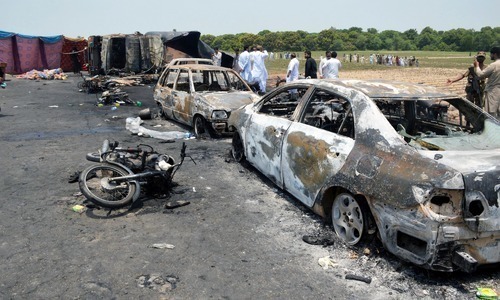The government's rule book suggests a penalty of Rs500 under the Petroleum Act,1934 for Shell Pakistan if the company is found guilty of negligence leading to the Bahawalpur tragedy, the Lahore High Court (LHC) was informed Friday.
The LHC was hearing a petition seeking accountability of those responsible for the Ahmadpur Sharqia incident and a record of the burn units at public hospitals in the province. The petitioner had submitted that the Ahmadpur Sharqia tragedy was a result of the local administration’s negligence.
LHC Chief Justice Syed Mansoor Ali Shah was told by a representative of the Explosives Department that the company responsible could only be fined Rs500 for the incident and Rs2,000 in case a similar incident occurred in the future.
Justice Shah is reported to have expressed severe displeasure and directed the federal government to legislate strictly on the issue.
"It is a matter of grave shame that prevailing rules and regulations impose such a pity fine in such horrible incidents," he said.
The government's counsel informed the court that the oil tanker's license had expired in 2016 and the Explosives Department had not renewed the license.
"Did you get a case registered against the company," the judge asked the representative of the Explosives Department.
He also asked who was responsible for checking the container before filling at the company, criticising the National Highway and Motorways Authority for "not being ready to accept responsibility for the fitness of vehicles".
The justice also asked that under which law the government had paid compensation to the affected families. "Did the cabinet deliberate and approve the compensation amount," he wondered.
"The court also wants to know about the role of insurance companies," he said, asking if the fuel containers were insured.
The petitioner's counsel, Safdar Shaheen Pirzada, argued that all departments have failed miserably in fulfilling their legal obligations.
"OGRA was bound to monitor and check the Shell Depot to check whether the oil tanker had obtained a fitness certificate or not. This tanker had only 14 wheels, which is also a violation of the rules. All enforcement authorities should take legal action against Shell," he argued.
The petitioner's counsel further said that the court may order Shell to pay compensation to the tune of Rs10 million to the heirs of each deceased person, along with compensation for the injured as well.
He also pleaded to the court to issue an order to change the Petroleum Act, 1934.
However, the counsel for Shell Pakistan, Shoaib Kashif, rejected all allegations against the company, maintaining that the company did not show any negligence and that the ill-fated oil tanker was not owned by the company, so it could not be held responsible for it.
The court later ordered the federal government, the provincial government, Shell Pakistan, Oil and Gas Regulatory Authority to submit a detailed report catering to all questions raised in the court.
The judge also sought replies from the Oil and Gas Regulatory Authority and the National Highways and Motorways Authority about the steps taken to control increasing oil tanker accidents.
In compliance with the court's earlier orders, the government had also submitted its own report on the tragedy. The report claimed that the incident was reported to police shortly after its occurrence and police personnel with the help of rescuers had shifted the injured to hospitals.
According to the report, there are a total of six burn units in public hospitals across the province: the Jinnah Hospital, Lahore operates a 78-bed burns unit; the Faisalabad Allied Hospital runs a 55-bed unit; Nishtar Hospital, Multan has 72 beds; the Holy Family Hospital, Rawalpindi 10 beds; Aziz Bhatti Hospital, Gujrat 10 beds; and the Mayo Hospital, Lahore 8 beds.














































